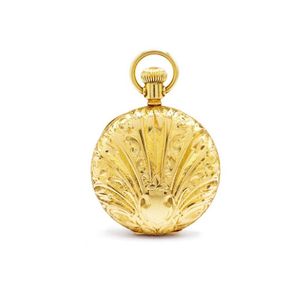Antique 18ct Yellow Gold Elgin Fob Watch, Circa 1910
Ladies antique 18ct yellow gold fob Elgin watch. Marked 18k 750 Fine to case and back plate.33.7 grams, case width 33 mm, stem wind movement runs & stops circa 1910
You must be a subscriber, and be logged in to view price and dealer details.
Subscribe Now to view actual auction price for this item
When you subscribe, you have the option of setting the currency in which to display prices to $Au, $US, $NZ or Stg.
This item has been sold, and the description, image and price are for reference purposes only.
- Back Plate - On many types of clocks, the movement operates between two plates, usually made of brass, one at the back, and the other at the front, which forms a mount for the dial.
On English bracket, mantle and table clocks the backplate was often visible through a glass door or panel from the late 17th century, and could be profusely engraved with scrolling decorations, flowers, foliage, birds, and figures. The engraving could also include the maker?s name.
The amount of engraving reduced and became simpler as the 18th century progressed, and by 1800, had been reduced to a border, often with the maker's name in the centre. By the early 1800s all decoration had ceased, and only the maker's name was added, and by the Victorian era, most bracket, mantle and table clocks had no engraving. - Circa - A Latin term meaning 'about', often used in the antique trade to give an approximate date for the piece, usually considered to be five years on either side of the circa year. Thus, circa 1900 means the piece was made about 1900, probably between 1895 and 1905. The expression is sometimes abbreviated to c.1900.
- Movement - The technical name for the workings of a clock or watch, and does not include the dial or case.
This item has been included into following indexes:
